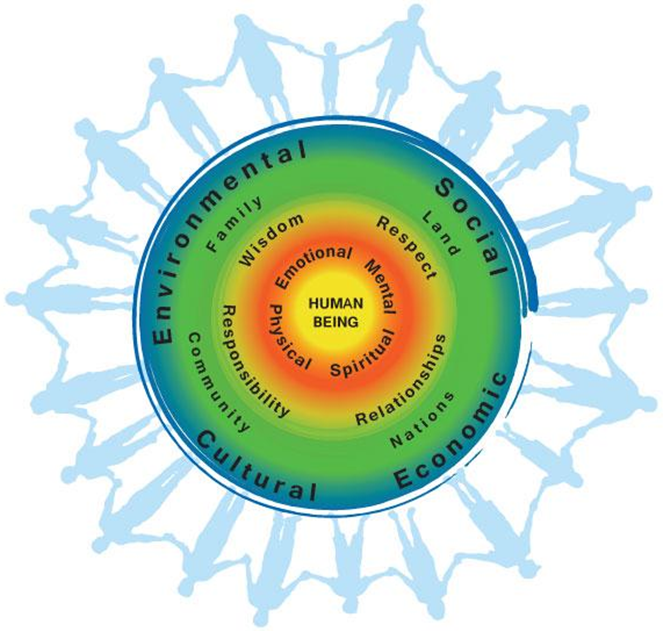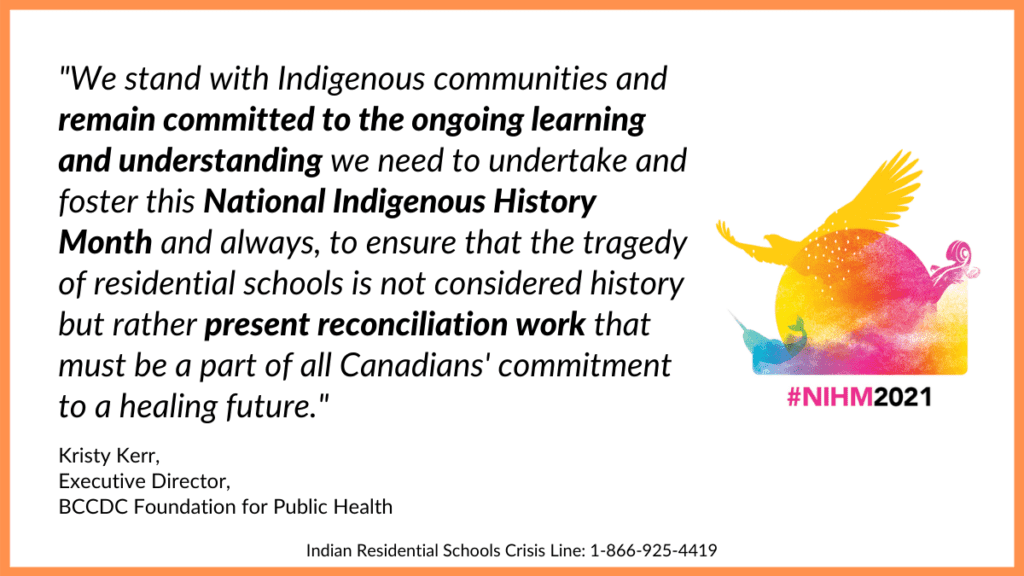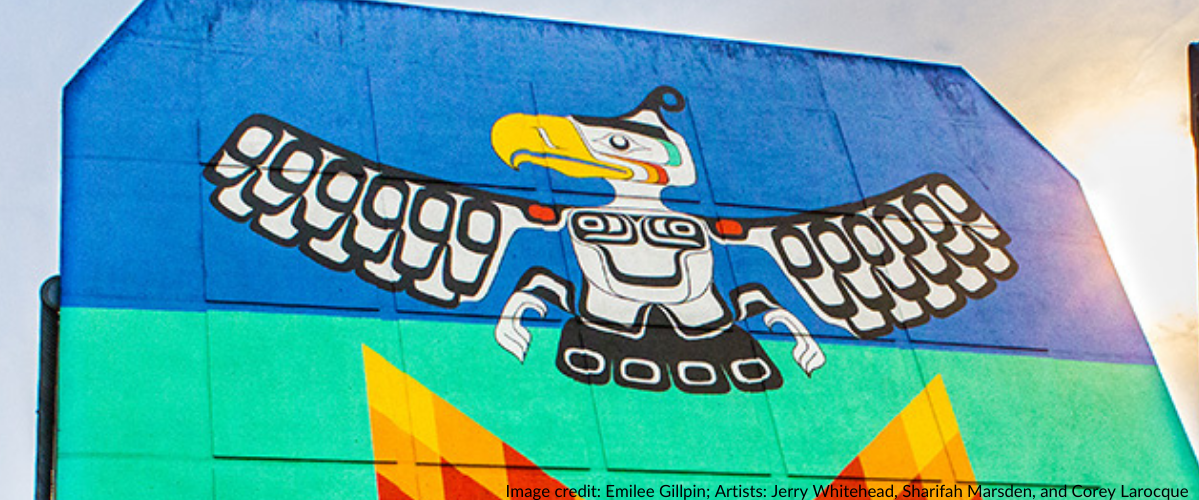Trigger warning: this blog contains information that may be difficult to read
National Residential School Crisis Line: 1-866-925-4419; Indian Residential Schools Survivors Society
This blog post must begin with a caveat. We are settlers and acknowledge our organization is a part of a larger ecosystem with roots in colonialism. We can only speak as allies to, and partners with, Indigenous communities. We do not and cannot speak on behalf of Indigenous people, and we cannot understand the extent and depth of harms and the violation of rights caused by colonization and ongoing systemic racism.
But, that doesn’t mean we shouldn’t speak or act.
What we can do, humbly, is to:
- Acknowledge our role as settlers, the gaps in our knowledge, and our commitment to learning and growing
- Encourage learnings and dialogue
- Work to address health inequities and improve health outcomes with Indigenous people
- Advocate for the role that we all must play in truth and reconciliation
- Raise awareness and generate conversation
Starting in 1831, and for more than 150 years, over 150,000 First Nations, Inuit, and Métis children were taken from their families to attend church-run schools. They were abused, and forced to assimilate, and their culture, languages, and diversity were stripped away. Many families didn’t know where their children were; many children never returned. This is just one horror of colonization in Canada.
June is National Indigenous History Month. Just a few days prior to the start of this month, to commemorate the history, heritage, and diversity of First Nations, Inuit, and Métis peoples in Canada, 215 undocumented remains of children, some as young as three years old, were uncovered at the former residential school in Kamloops, BC, on the lands of Tk’emlups te Secwépemc First Nation. This is not history. This is now.
Residential schools and other harms of colonialism have led to health and socioeconomic disparities, poorer health outcomes, and a profound impact on the health of Indigenous people. And systemic Indigenous-specific racism is evident in Canada today.
In November 2020, In Plain Sight: Addressing Indigenous-specific Racism and Discrimination in BC Health Care was released. This review finds multiple examples of racism and discrimination, and demonstrates widespread systemic racism within the BC health care system.
Racism and colonialism will continue to impact past, current, and future generations. Systemic racism will continue to perpetuate harms to Indigenous people.
We can see the impacts today in the overdose crisis and the disproportionate numbers of First Nations people who are dying.
Yet, there are examples of steps toward progress:
- Beginning in 2007, the Truth and Reconciliation Commission undertook work that culminated in a final report in 2015 with 94 calls to action.
- In 2007, the United Nations General Assembly adopted the United Nations Declaration on the Rights of Indigenous Peoples (UNDRIP) as a framework for reconciliation. In November 2019, BC became the first jurisdiction in Canada to formally adopt the internationally-recognized standards in the UNDRIP by making it law in the Declaration on the Rights of Indigenous Peoples Act.
- Formed in 2013, the First Nations Health Authority (FNHA) is the first and only provincial health organization of its kind in Canada to provide leadership and culturally-safe practices to improve health outcomes for First Nations people.
However, there is much more to be done.
Our goal of health equity will not come to fruition if we don’t take responsibility and build partnerships with Indigenous communities. One such partnership is Compassion, Inclusion, & Engagement (CIE), a program created between the BC Centre for Disease Control and the FNHA, that empowers people with lived and living experience of substance use (peers) to take action and stop overdose in their community. Because First Nations people represent only 3.3% of BC’s population, yet in 2020 they died at 5.3 times the rate of other BC residents, the work peers do through CIE is critical in saving lives.
Indigeneity is a social determinant of health, as is racism—we must better address the social determinants of health for all communities. We can learn a great deal from Indigenous culture and wellbeing, that puts holistic health, wellness, and self-determination at its core, recognizing the importance of balanced inter-relationships between the physical, mental, emotional, and spiritual. This perspective reflects a wonderful view of how we can articulate positive health, and create healthier humans, families, and communities. This perspective reflects our goal to put the healthy human at the core of everything we do.

We must work today, and for the future, on the hard truths and the vital reconciliations—we must work toward healing. And through our collective commitment to Activate Health, we can do this together.
- Learn: about residential schools, diverse cultures, wellbeing and traditional healing, and the lands on which you live, work, and play.
- Read: see below for a few resources as a starting point.
- Act: understand the Truth and Reconciliation calls to action, eliminate stigma, acknowledge the role of colonization and use decolonizing language, address racism when you see it, talk to elected officials, friends, and family.
- Support: community organizations, Indigenous-owned businesses, and CIE.
- Be meaningful: use land acknowledgments but make them personal and avoid tokenism, build self-awareness and your own intentions, and use the right terms and people-first language.
- Celebrate and commemorate: June 21st is National Indigenous Peoples Day and September 30, 2021 is Orange Shirt Day. Mark these occasions respectfully (and safely, per COVID-19 protocols) and show your commitment to Indigenous rights and support for residential school survivors and their communities.
We commit that to Activate Health we must also take these steps, foster diversity, address racism, and prioritize equity and social justice in our public health programs and activities.
Our place in this ecosystem means we have a responsibility to challenge the status quo, and to play a role in a way forward that breaks the cycles of racism and harm.
This great responsibility falls on all of us and the time is now. It is clear this is not about history and we must not keep this in the past.

As with the caveat at the beginning, so too is there a caveat as we wrap up this post: this short piece is not nearly enough to fully describe or articulate Indigenous roots, culture, health, stories, or ways forward, and barely skims the surface of the healing ahead.
We acknowledge how much more we must, and can, do.
Resources and further reading:
Honouring the Truth and Reconciling for the Future: Summary of the Final Report of the Truth and Reconciliation Commission of Canada
United Nations Declaration on the Rights of Indigenous Peoples (UNDRIP)
In Plain Sight Reports and Supplements
National Centre for Truth and Reconciliation
How to Support Survivors of Residential Schools
Indigenous Peoples Atlas of Canada
In Her Circle: The influence of the COVID-19 pandemic on Indigenous Women’s Health in BC report by BC Women’s Health Foundation and Reciprocal Consulting
Reclaiming Power and Place: The Final Report of the National Inquiry into Missing and Murdered Indigenous Women and Girls
BC Centre for Disease Control: Chee Mamuk is an Indigenous program that provides innovative and culturally appropriate training, educational resources and wise practical models in STIs, hepatitis and HIV
The Canadian School of Public Service: Indigenous Learning Series
